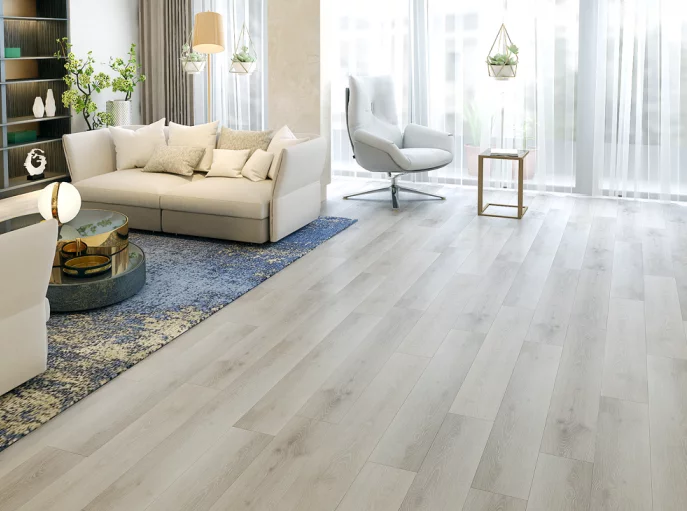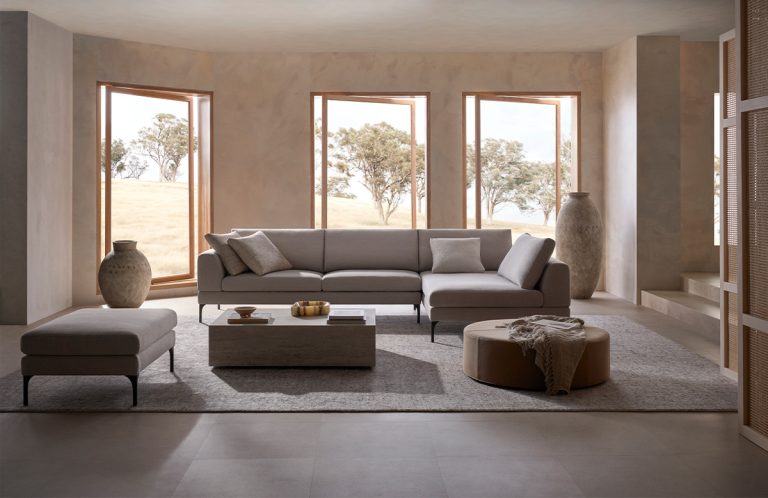Pros and Cons of Using SPC Flooring in Your Home

Table of Contents
SPC flooring is one of the most popular choices for homes. This versatile type of rigid luxury vinyl flooring offers several benefits but also has some downsides to consider. Let’s take a look at the key pros and cons of using SPC flooring to help you decide if it’s the right choice for your home.
What is SPC Flooring?
SPC flooring consists of three layers – a stone plastic composite core of limestone powder mixed with stabilizers, a print layer with the desired color or wood grain pattern, and a transparent wear layer on top for protection. The core gives it durability and structure. The overall thickness is usually between 2mm and 6mm.
SPC is 100% waterproof, and designed to resist swelling and damage even with leaks or flooding. It retains the look and feel of wood, tile, or stone flooring while requiring less intensive installation and maintenance. Modern printing technologies allow very realistic and stylish visuals.
Pros of Using SPC Flooring
Here are some of the major benefits that make SPC a top choice for many homeowners:
Fully Waterproof
The dense core and seamless surface leave no cracks for moisture to seep through, an advantage over products like laminate or hardwood prone to warping from spills. You can install SPC flooring in any area of the home without worry – kitchens, laundry rooms, and basements with risk of flooding. Even standing water or pet accidents won’t faze this floor.
Resistant to Heat Damage
Excessive sunlight streaming through windows cannot discolor SPC floors. In areas like the UAE, there is so much heat out there. But if you buy SPC flooring in Dubai from a reliable supplier, you can get it with a UV-protected layer. Such SPC floor tiles do not get damaged by heat or sunlight exposure.
Stable Material Resists
Durable & Scratch-Resistant Surface
SPC flooring stands up impressively to daily wear and tear. The protective top coat provides resistance against scratches from pet claws, furniture legs, shoes, falling objects, and toys dragged around. Though no flooring is invincible, SPC holds up better to heavy traffic situations long-term versus most alternatives.
Dents
Under the decorative layer, the limestone-based core creates rigidity and shape retention. SPC floors don’t bend easily or develop impressions from pressure like foam underlayment. The closed-cell structure prevents the growth of mold or bacteria within the core layers too. You can install SPC successfully over a range of existing sub-floors in sound condition.
Comfortable Underfoot & Noise Reduction
SPC includes attached padding in newer generations. Brand name cores like Rigid-Core use high-density polymers that have some flex yet feel sturdy, pleasant textures underfoot. This cushioning also dampens ambient noise from footsteps or moving furniture. SPC flooring receives high ratings for comfort and livability.
Realistic Wood & Stone Looks
Top brands of SPC mimic patterns in wood and natural stone with remarkable accuracy. The best floors have slight graining and color variation for a convincingly authentic appearance overall. Styles range widely – distressed hardwoods, ceramic, travertine, marble, and more. SPC now competes with laminates on aesthetics while outpacing resilience.
Easier Installation than Natural Materials
The lightweight, interconnected floating planks of quality SPC flooring use angle-tap or fold-down joining systems to form a tight seal without glue or nails as hardwood requires. Homeowners can tackle DIY installation confidently in a single day. Since SPC has good dimensional stability, it leaves expansion gaps mainly at wall perimeters only.
Cons to Consider
SPC isn’t flawless. These are a few potential disadvantages:
Can Feel Too Firm Underfoot for Some
People with sensitive joints may prefer softer vinyl plank floors with more bounce-back. Brands are formulating cores with better acoustics and comfort now, but check what underlay comes attached or install your own. An added foam pad makes a substantial difference in the luxury feel.
Off-Gassing Smell with Some Brands
A few brands use strong adhesives or inferior cores prone to an unpleasant “new floor smell” that takes weeks of ventilating to disappear after installation. Seek Greenguard or FloorScore certification plus positive reviews to minimize impactful off-gassing. Ask about adhesives used too.
Conclusion: A Smart Choice with Precautions
If you take steps to protect and maintain it properly, SPC offers one of the best ratios of visual appeal, durability, and waterproof peace of mind. Choosing quality planks with attached underlayment is important for comfort and longevity. Heeding the cons above will help you get years of satisfaction from this versatile custom flooring in homes with kids, pets, and entertaining traffic.
With the right expectations of preserving the surface shine and avoiding excess moisture or heat damage, SPC creates an attractive living space to enjoy without constant upkeep demands.






